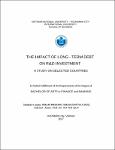| dc.description.abstract | Many prior studies on the relationship between corporate debt and research and development (R&D) expense suggest that the two variables are inversely related. With regard to debt, long-term debt plays an important role in corporate performance and long-term investment. This research aims to explore the linkage between long-term debt and R&D expenditure. It examines the non-financial listed firms in China, India, Japan, and Korea, which are the representatives of the developing and developed economies. Following that, the influence of long-term debt usage on R&D expenditure is thoroughly analyzed by employing corporate characteristics and industry factor as control variables. The results indicate that there is a strong inverse relationship between the level of long-term debt employed and the amount of R&D expenditure in both developed and developing country group. The effect is recorded to be the most significant in health-care and information technology sectors. More importantly, the results support the negative impact of long-term debt on the future investment in R&D projects and the reverse effect of the R&D investment on future long-term debt obtain. It can be concluded that the higher the current long-term debt usage will lead to fewer chances that firms will invest in R&D. Also, the high level of R&D undertaken can cause the restriction in long-term debt employed. | en_US |


